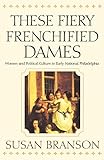These Fiery Frenchified Dames : Women and Political Culture in Early National Philadelphia / Susan Branson.
Material type: TextSeries: Early American StudiesPublisher: Philadelphia : University of Pennsylvania Press, [2010]Copyright date: ©2001Description: 1 online resource (224 p.) : 16 illusContent type:
TextSeries: Early American StudiesPublisher: Philadelphia : University of Pennsylvania Press, [2010]Copyright date: ©2001Description: 1 online resource (224 p.) : 16 illusContent type: - 9780812217773
- 9780812201413
- Women in public life -- Pennsylvania -- Philadelphia -- History -- 18th century
- Women -- Political activity -- Pennsylvania -- Philadelphia -- History
- Women -- Pennsylvania -- Philadelphia -- Social conditions
- Books of Regional Interest
- HISTORY / United States / Revolutionary Period (1775-1800)
- American History
- American Studies
- Books of Regional Interest
- History
- Political Science
- 305.42/09748/11 21
- HQ1236.5.U6 B75 2001eb
- online - DeGruyter
- Issued also in print.
| Item type | Current library | Call number | URL | Status | Notes | Barcode | |
|---|---|---|---|---|---|---|---|
 eBook
eBook
|
Biblioteca "Angelicum" Pont. Univ. S.Tommaso d'Aquino Nuvola online | online - DeGruyter (Browse shelf(Opens below)) | Online access | Not for loan (Accesso limitato) | Accesso per gli utenti autorizzati / Access for authorized users | (dgr)9780812201413 |
Browsing Biblioteca "Angelicum" Pont. Univ. S.Tommaso d'Aquino shelves, Shelving location: Nuvola online Close shelf browser (Hides shelf browser)

|

|

|

|

|

|

|
||
| online - DeGruyter Past Convictions : The Penance of Louis the Pious and the Decline of the Carolingians / | online - DeGruyter Fairy Godfather : Straparola, Venice, and the Fairy Tale Tradition / | online - DeGruyter Those of My Blood : Creating Noble Families in Medieval Francia / | online - DeGruyter These Fiery Frenchified Dames : Women and Political Culture in Early National Philadelphia / | online - DeGruyter Dangerous to Know : Women, Crime, and Notoriety in the Early Republic / | online - DeGruyter The Afterlife of Character, 1726-1825 / | online - DeGruyter A Novel Marketplace : Mass Culture, the Book Trade, and Postwar American Fiction / |
Frontmatter -- Contents -- Introduction -- Chapter One. Women and the Development of American Print Culture -- Chapter Two. American Women and the French Revolution -- Chapter Three. Women as Authors, Audiences, and Subjects in the American Theater -- Chapter Four. The Creation of the American Political Salon -- Conclusion -- Note -- Bibliography -- Index -- Acknowledgments
restricted access online access with authorization star
http://purl.org/coar/access_right/c_16ec
On July 4, 1796, a group of women gathered in York, Pennsylvania, to celebrate the twentieth anniversary of American independence. They drank tea and toasted the Revolution, the Constitution, and, finally, the rights of women. This event would have been unheard of thirty years before, but a popular political culture developed after the war in which women were actively involved, despite the fact that they could not vote or hold political office. This newfound atmosphere not only provided women with opportunities to celebrate national occasions outside the home but also enabled them to conceive of possessing specific rights in the young republic and to demand those rights in very public ways.Susan Branson examines the avenues through which women's presence became central to the competition for control of the nation's political life and, despite attempts to quell the emerging power of women-typified by William Cobbett's derogatory label of politically active women as "these fiery Frenchified dames"-demonstrates that the social, political, and intellectual ideas regarding women in the post-Revolutionary era contributed to a more significant change in women's public lives than most historians have recognized.As an early capital of the United States, the leading publishing center, and the largest and most cosmopolitan city in America during the eighteenth century, Philadelphia exerted a considerable influence on national politics, society, and culture. It was in Philadelphia that the Federalists and Democratic Republicans first struggled for America's political future, with women's involvement critical to the outcome of their heated partisan debates. Middle and upper-class women of Philadelphia were able to achieve a greater share in the culture and politics of the new nation through several key developments, including theaters and salons that were revitalized following the war, allowing women to intermingle and participate in political discussions, and the wider availability of national and international writings, particularly those that described women's involvement in the French Revolution-perhaps the most important and controversial historical event in the early development of American women's political consciousness.Given these circumstances, Branson argues, American women were able to create new more active social and political roles for themselves that brought them out of the home and into the public sphere. Although excluded from the formal political arenas of voting and lawmaking, American women in the Age of Revolution nevertheless thought and acted politically and were able to make their presence and opinions known to the benefit of a young nation.
Issued also in print.
Mode of access: Internet via World Wide Web.
In English.
Description based on online resource; title from PDF title page (publisher's Web site, viewed 24. Apr 2022)


